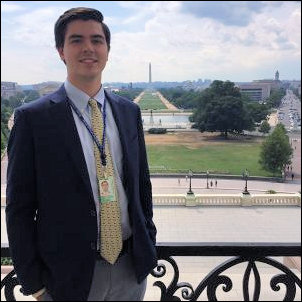
Kevin McMahon with UVa’s Young Americans for Freedom.
The University of Virginia Student Council has denied the Young Americans for Freedom (YAF), a conservative student group, recognition as an official student organization. The decision effectively disallows YAF from reserving meeting space on the university grounds, advertising at activities fairs, requesting storage space, or applying for student-activity-fee funding through the council.
The premise behind the rejection is that YAF is a “political organization” not open to all. YAF requires members to support the Sharon Statement, a set of philosophical and political statements defining the core principles of the organization.
“Recognized CIOs (contracted independent organizations) cannot restrict students from joining an organization on the basis of political affiliation, which includes limiting membership to students who support the Sharon Statement,” wrote Ty Zirkle, vice president for organizations for the UVa Student Council in a letter to Kevin McMahon, president of YAF-UVA. “Support for the Sharon Statement can absolutely be included in the mission/purpose section of the constitution and will naturally attract interested students, but it cannot be a membership requirement.”
That restriction violates both Virginia state law and the U.S. Constitution, argues M. Casey Mattox, director of the Center for Academic Freedom, in a letter to UVa officials. He cites state code that says:
A religious or political student organization may determine that ordering the organization’s internal affairs, selecting the organization’s leaders and members, defining the organization’s doctrines, and resolving the organization’s disputes are in furtherance of the organization’s religious or political mission and that only persons committed to that mission should conduct such activities (my emphasis).
Additionally, the U.S. Supreme Court has upheld an interpretation of the First Amendment declaring that “the ability of like-minded individuals to associate for the purpose of expressing commonly held views may not be curtailed.”
Under UVa’s policy, writes Mattox, “if an advocacy group is ‘political,’ as YAF-UVA was here, it may not state its requirements in its own constitution.”
The University of Virginia’s response? Says spokesman Anthony de Bruyn: “The University has received a letter regarding an organization’s interest in status as a Contracted Independent Organization (CIO). We are reviewing the matter.”
The University of Virginia has some 800 student clubs and organizations.
Bacon’s bottom line: I will confess to a major bias on this story. Forty-some years ago, I was a foot soldier of the Young Americans for Freedom at UVa. I can’t remember if we were an officially recognized student organization or not. If so, we certainly didn’t get much Student Council support because I don’t recall that we did anything that entailed spending much money. Whatever the case, I am sympathetic to the aims and principles of the group.
Moreover, I have a second bias: I know what it’s like to be turned down by the UVa Student Council. The one student organization I led during college was a group of 20 or 30 guys who met late every Friday afternoon to play military board games in the Navy ROTC building. Now, this was around 1974 or 1975 when the Vietnam War was winding down and universities were centers of ferocious opposition to the war. We knew we couldn’t go to Student Council and say, hey, we’re with the “War Game Club,” can you give us some money? So, we named ourselves the Historical Simulation Society. As the head nerd, I duly applied for a $50 dispensation from the Student Council so we could buy some new board games. As it happened, the Student Council President was one Larry J. Sabato who back then had long, flowing black hair and, I can tell you, was a lot more radical than he is today as a political science professor. Needless to say, Sabato and the rest of the Student Council saw through our subterfuge and refused to give us one red cent. Our group was one of only two supplicants to get stiffed. Larry and I laugh about it to this day. Anyway, I can feel the YAF’s pain.
Fully cognizant of my biases in the matter, I find it absurd that UVa might withhold recognition to the YAF on the basis of what strikes me as a legalistic technicality — one that likely violates state law and that undeniably vitiates the spirit of the First Amendment. College campuses are hotbeds of radical political activity, and numerous organizations with political missions receive money from student activity fees. Be forewarned, UVa, when you approach the General Assembly looking for state support: Turning down the YAF application will only feed the growing narrative that universities are centers of leftist intolerance unworthy of taxpayer support.
Update: Aargh! I’m getting so old, I can’t even remember when I attended UVa. The original version of this post had dates that were off by four years. (Hat tip: Allen Barringer.)
Update from UVa: Here is added information provided by UVa spokesman Anthony de Bruyn:
The University has carefully reviewed the concerns raised on behalf of students seeking to form a Contracted Independent Organization (CIO) under the name Young Americans for Freedom (YAF). In November, after consulting with our Student Activities staff, Student Council had requested two changes to the constitution submitted by YAF, consistent with their reading of our non-discrimination policy. When no response was received, the YAF CIO application was temporarily denied pending future resolution of this open issue. The decision by Student Council was not viewpoint based, but rather based upon an error in applying the non-discrimination policy. The CIO application from YAF was never voted on by the Student Council representative body for final approval or denial. The University has now requested that Student Council take steps to remedy this as soon as possible.


